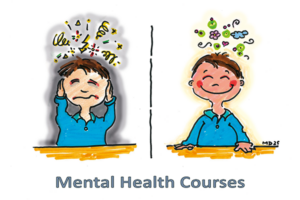Seminar Series on Mental Health Management at the University of Mannheim – ENGAGE.EU
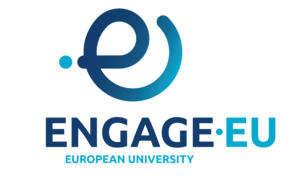
This workshop series aims to equip participants with evidence-based knowledge and practical tools to manage their mental health effectively. By combining theory and hands-on application, participants are given valuable tools to foster long-term mental health in their academic, professional and personal lives.
General Information
Registration will open on 29 January 2026!
To register, please click on the desired course in the list below.
These courses are free of charge!
Language of instruction: English
The courses take place online.
Do you have any questions?: studiumgenerale@service.uni-mannheim.de
Mental Health Course Programme – Spring 2026
Essentials of Positive Psychology: Strengthen Your Well-being (1/2) - Dr. Belinda Merkle/Ronja Steinhauser (Universität Mannheim)
Time:
3 March 2026
5.00 p.m. – 7.00 p.m.
Place:
Online (via Zoom)
Number of participants:
12
Course description:
Can well-being be changed? Yes – and sustainably!
In this workshop, you explore and apply key theories of sustainable mental health, such as Basic Needs Theory, the Hedonic Treadmill, and the Sustainable Happiness Model. You’ll learn what truly influences well-being – and how to ensure that these positive effects last over time.
Through reflection and practical exercises, you will build a strong foundation to enhance mental resilience. Whether in studies, work, or personal growth – this workshop empowers you to take mental well-being into your own hands.
- Recommended in combination with (2/2) Essentials of Behavior Change: Set and Achieve Your Goals – but if that’s not possible, each session can also be attended on its own.
- This session also serves as a helpful foundation for the upcoming resource-specific workshops, by providing an applied framework for sustainable well-being – helping you get the most out of later exercises.
About the lecturers:
 Dr. Belinda Merkle earned her PhD in Educational Psychology at the University of Mannheim. She has several years of teaching experience, having taught courses in positive and educational psychology, and her research includes work on (positive) interventions to foster well-being and success.
Dr. Belinda Merkle earned her PhD in Educational Psychology at the University of Mannheim. She has several years of teaching experience, having taught courses in positive and educational psychology, and her research includes work on (positive) interventions to foster well-being and success.
 Ronja Steinhauser works at the Chair of Educational Psychology at the University of Mannheim. She has several years of teaching experience and her research includes work on the well-being of PhD students.
Ronja Steinhauser works at the Chair of Educational Psychology at the University of Mannheim. She has several years of teaching experience and her research includes work on the well-being of PhD students.
Essentials of Behavior Change: Set and Achieve Your Goals (2/2) - Dr. Belinda Merkle/Ronja Steinhauser (Universität Mannheim)
Time:
3 March 2026
7.15 p.m. – 9.15 p.m.
Place:
Online (via Zoom)
Number of participants:
12
Course description:
Bridge the gap between good intentions and real change!
This practical workshop focuses on how to set meaningful goals – and actually follow through – in a way that supports both mental health and long-term success.
Based on behavior change models like the Health Action Process Approach, you will practice hands-on tools such as mental contrasting, if–then planning, and coping planning. You’ll learn how to choose goals that truly nourish you – and how to achieve them. Ideal for anyone who wants to move from intention to action.
- Recommended in combination with (1/2) Essentials of Positive Psychology – but each session can also be attended on its own.
- This session also serves as a helpful foundation for the upcoming resource-specific workshops, by introducing evidence-based, practical strategies for setting well-being-related goals and following through with them.
About the lecturers:
 Dr. Belinda Merkle earned her PhD in Educational Psychology at the University of Mannheim. She has several years of teaching experience, having taught courses in positive and educational psychology, and her research includes work on (positive) interventions to foster well-being and success.
Dr. Belinda Merkle earned her PhD in Educational Psychology at the University of Mannheim. She has several years of teaching experience, having taught courses in positive and educational psychology, and her research includes work on (positive) interventions to foster well-being and success.
 Ronja Steinhauser works at the Chair of Educational Psychology at the University of Mannheim. She has several years of teaching experience and her research includes work on the well-being of PhD students.
Ronja Steinhauser works at the Chair of Educational Psychology at the University of Mannheim. She has several years of teaching experience and her research includes work on the well-being of PhD students.
Self-care with AI: Strengthening your mental wellbeing with algorithms - Danielle Ang (Université Toulouse Capitole)
Time:
25 March 2026
5.00 p.m. – 6.30 p.m.
Place:
Online (via Zoom)
Number of participants:
15
Course description:
Therapy at your fingertips? Make AI your smart companion in building mental wellbeing
We use generative AI and popular digital applications every day to fulfill a variety of tasks. What if we can fully harness the potential of AI to strengthen our mental resilience, build emotional clarity, and manage our overall mental wellbeing? This course provides the building blocks on how to map out your mental health journey with AI!
Artificial Intelligence (AI)-enabled Mental Health Applications (MHAs) have emerged as promising tools with significant clinical evidence on their effectiveness in improving mental health (Figueroa & Aguilera, 2020). Recent studies by a group of Dartmouth researchers showed that participants who spent 8 therapy sessions (6 hours over 8 weeks) with a psychotherapeutic chatbot had 51% reduction in symptoms of depression and 31% in anxiety, reporting high levels of trust and therapeutic alliance (Dartmouth College, 2025). By leveraging user-generated data and advanced algorithmic processing, MHAs offer scalable, cost-effective, and personalized mental health support, including psychoeducation, mood and emotions tracking, cognitive behavioral therapy, and tailored behavioral interventions (O’Loughlin et al., 2019). With the barriers of getting proper mental health care, AI enabled mental health solutions could be equally effective in helping users improve their mental health care (Gamble, 2020).
In this 90-minute course, I will be proposing effective usage of AI in mental wellbeing with key examples from empirical studies, role of AI in mental health support, recommendation of AI enabled mental health apps, and how to circumvent limits and ethical issues (e.g. errors, data privacy, dependance & maximizing effectiveness) (De Freitas et al., 2024; Nosta, 2025a, 2025b; O’Loughlin et al., 2019). Participants would have a couple of interactive sessions to try out a mental health app or learn prompts for generative AI like ChatGPT and design their own mental health app route map. (Activities may be adjusted based on discussion time).
Your takeaways:
You will learn how AI tools can support your emotional wellbeing and build mental resilience, how to select the right AI tools for your wellbeing, strategies on managing ethical implications such as dependance/overreliance, errors (e.g. sycophancy for bad decisions and hallucinations for less recommended interventions) and data privacy. A critical insight into its limitations would be provided together with some tips on creating healthy parameters and boundaries in your mental health-AI experience.
References:
Dartmouth College. (2025). First trial of therapy chatbot suggests AI can provide ‘gold-standard’ mental-health care. https://medicalxpress.com/news/2025-03-clinical-trial-ai-therapy-chatbot.html
De Freitas, J., Uğuralp, A. K., Oğuz‐Uğuralp, Z., & Puntoni, S. (2024). Chatbots and mental health: Insights into the safety of generative AI. Journal of Consumer Psychology, 34(3), 481–491. https://doi.org/10.1002/jcpy.1393
Gamble, A. (2020). Artificial intelligence and mobile apps for mental healthcare: A social informatics perspective. Aslib Journal of Information Management, 72(4), 509–523. https://doi.org/10.1108/AJIM-11-2019-0316
Nosta, J. (2025a). AI-Driven Psychosis: The Right Prompt at the Wrong Time | Psychology Today. https://www.psychologytoday.com/us/blog/the-digital-self/202508/ai-driven-psychosis-the-right-prompt-at-the-wrong-time
Nosta, J. (2025b). Do LLM Conversations Need a ‘Gray Box’ Warning Label? | Psychology Today New Zealand. https://www.psychologytoday.com/nz/blog/the-digital-self/202507/do-llm-conversations-need-a-gray-box-warning-label
O’Loughlin, K., Neary, M., Adkins, E. C., & Schueller, S. M. (2019). Reviewing the data security and privacy policies of mobile apps for depression. Internet Interventions, 15, 110–115. https://doi.org/10.1016/j.invent.2018.12.001
About the lecturer:
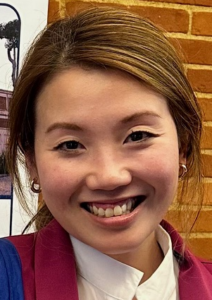 Danielle ANG is a fourth year Marketing Ph.D. student at Toulouse School of Management. Prior to her masters, she majored in clinical psychology at Monash University. She is widely passionate about harnessing the capabilities of AI to improve mental health and sees AI as a tool worth utilizing to improve the barriers of accessing mental health care.
Danielle ANG is a fourth year Marketing Ph.D. student at Toulouse School of Management. Prior to her masters, she majored in clinical psychology at Monash University. She is widely passionate about harnessing the capabilities of AI to improve mental health and sees AI as a tool worth utilizing to improve the barriers of accessing mental health care.
Her current research falls at the intersection of psychology, consumer behavior and AI, and focuses on providing theoretical understanding and managerial insights on the human-AI experience of vulnerable consumers in the context of mental health.
She currently teaches digital marketing to Master students and occasionally meditates with an AI-enabled wellbeing app.
The Inner Resource: Mind–Body Tools for Sustainable Mental Health - Anna-Maria Nikolaeva (University of National and World Economy, Sofia)
Time:
28 March 2026
10.00 a.m. – 12.00 p.m.
Place:
Online (via Zoom)
Number of participants:
18
Course description:
This short online course explores mental health management through the lens of self-regulation, reflective awareness, and sustainable well-being in high-pressure academic and professional environments. Grounded in evidence-based mindfulness and self-compassion research, the session introduces participants to structured practices that support emotional regulation, cognitive clarity, and resilience.
The course integrates scientifically validated approaches such as mindfulness-based stress reduction (MBSR), interoceptive awareness, and compassion-focused reflection, complemented by guided experiential exercises. Emphasis is placed on translating theory into practical tools that can be applied in academic work, leadership contexts, and knowledge-intensive professions.
Participants will gain practical strategies to manage stress, enhance emotional self-awareness, and cultivate sustainable inner resources that support long-term mental well-being.
About the lecturer:
 Anna-Maria Nikolaeva is a Ph.D. researcher at the University of National and World Economy (UNWE), Sofia, with an academic background in peace and security studies, innovation, and sustainability. Her research focuses on the human dimension of security and resilience, well-being in high-pressure professional environments, and the role of reflective practices in sustainable systems and organizational contexts.
Anna-Maria Nikolaeva is a Ph.D. researcher at the University of National and World Economy (UNWE), Sofia, with an academic background in peace and security studies, innovation, and sustainability. Her research focuses on the human dimension of security and resilience, well-being in high-pressure professional environments, and the role of reflective practices in sustainable systems and organizational contexts.
Alongside her academic work, she has over 16 years of experience in mindfulness-based and contemplative practices, including formal training as a yoga teacher. These practices are used selectively as complementary tools within educational and research-oriented settings, supporting embodied learning and reflective capacity. Her interdisciplinary approach bridges evidence-based mental health frameworks with structured experiential methods, aiming to make mental health management accessible, applicable, and relevant to academic and professional communities.
The Courage to Connect: Reflective and Interpersonal Tools for Inclusion and Mental Well-being - Oumnia Abidi (Université Toulouse Capitole)
Time:
16 April 2026
4.00 p.m. – 7.00 p.m.
Place:
Online (via Zoom)
Number of participants:
19
Course description:
We interact with other people every day: at work, in public spaces, and in our personal lives. While diversity and connection enrich our relationships, they can also lead to
misunderstandings, cultural tensions, and even exclusion. When we lack the tools to handle these moments effectively, the impact on our mental well-being can be significant.
This workshop starts with the premise that interpersonal friction is inevitable and focuses on how to approach it with greater self-awareness, empathy, and compassion, both for
ourselves and for others. We will explore common sources of conflict, such as misattributing intentions or overemphasizing certain behaviors, and learn evidence-based practices that cultivate understanding, resilience, and connection. The goal is for us to reinforce essential relational skills, such as self-compassion, perspective taking, boundary setting, compassionate communication, and allyship, all grounded in the science of mental health and human connection.
About the lecturer:
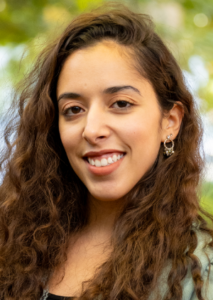 Oumnia Abidi is a fourth year doctoral candidate at the Toulouse School of Management in France. Her research focuses on organizational behavior and human resource management, with a particular emphasis on language-sensitive research, especially the role of non-native accents in the workplace. She examines this topic from both speakers’ and listeners’ perspectives, using a range of quantitative and qualitative methodologies. More broadly, she is interested in the challenges of intercultural communication and in how empathy can foster stronger connections and seeks to brings these insights into her teaching and workshop facilitation.
Oumnia Abidi is a fourth year doctoral candidate at the Toulouse School of Management in France. Her research focuses on organizational behavior and human resource management, with a particular emphasis on language-sensitive research, especially the role of non-native accents in the workplace. She examines this topic from both speakers’ and listeners’ perspectives, using a range of quantitative and qualitative methodologies. More broadly, she is interested in the challenges of intercultural communication and in how empathy can foster stronger connections and seeks to brings these insights into her teaching and workshop facilitation.
Workshop Mindfulness - Ivan Nyklicek (Tilburg University)
Time:
8 May 2026
10.00 a.m. – 12.00 p.m.
Place:
Online (via Zoom)
Number of participants:
12
Course description:
The workshop has mindfulness as its focus: paying attention to phenomena of the present moment in an accepting, nonjudgmental way. This attitude has been found to be beneficial for stress and anxiety reduction, and enhancement of psychological well-being and quality of life.
In the present workshop, we will elucidate the central mechanisms of mindfulness and practice with both bodily passive and bodily active practices, mainly from the Mindfulness-Based Stress Reduction program (Kabat-Zinn, 1990). Bodily passive practices include scanning bodily sensations in a resting position (bodyscan), sitting meditation with a focus on breathing sensation (while noticing and letting go of thinking), etc. Bodily active practices may include mindful preparing and eating a food item (e.g. a piece of fruit) and light mindful stretches/movements. All practices involve noticing the focus of one’s attention and, if distracted, gently redirecting it to present moment sensations, feelings, reactions. Sharing of experiences will also be part of the workshop.
About the lecturer:
 Ivan Nyklíček obtained his Ph.D. in Psychology in 1997 at Tilburg University, Netherlands. Currently, he is Associate Professor at the Department of Medical and Clinical Psychology at Tilburg University and is mainly involved in research on correlates, effects, mechanisms, and moderators of mindfulness interventions. Besides his academic work, since 2005, he is also mindfulness trainer in Tilburg.
Ivan Nyklíček obtained his Ph.D. in Psychology in 1997 at Tilburg University, Netherlands. Currently, he is Associate Professor at the Department of Medical and Clinical Psychology at Tilburg University and is mainly involved in research on correlates, effects, mechanisms, and moderators of mindfulness interventions. Besides his academic work, since 2005, he is also mindfulness trainer in Tilburg.
Psychosocial risks management within organizations - Stéphan Pezé (Université Toulouse Capitole)
Time:
21 May 2026
5.00 p.m. – 6.30 p.m.
Place:
Online (via Zoom)
Number of participants:
18
Course description:
Psychosocial risks (PSR) are a major social issue for employees’ mental health within organizations. The human stakes are high within the company: malaise and stress affect a quarter of all employees, and many cases are brought before the courts. Organizations have an obligation to manage psychosocial risks, and to achieve this, human resources managers and managers need to understand the precise definition of these risks and the prevention tools available to them. They also need to know what action plans to implement if psychosocial risks are detected. The aim of this seminar is to show how to organize a collective, preventive, multi-disciplinary (medical, management, legal, etc.) approach to prevention, open to social dialogue and participation.
Workshop structure:
Lecture followed by a Q/A session
About the lecturer:
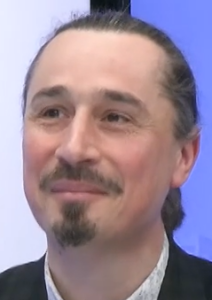 Stéphan Pezé is a full professor of management sciences at Toulouse Capitole University, affiliated with the CNRS’s TSM-R research centre. Since 2003, as a consultant, he has assisted numerous professionals from all sectors of activity in improving occupational health and safety management systems. As a researcher, he has written a thesis on the management of psychosocial risks in teams and has authored several books and articles on the prevention of mental health risks at work.
Stéphan Pezé is a full professor of management sciences at Toulouse Capitole University, affiliated with the CNRS’s TSM-R research centre. Since 2003, as a consultant, he has assisted numerous professionals from all sectors of activity in improving occupational health and safety management systems. As a researcher, he has written a thesis on the management of psychosocial risks in teams and has authored several books and articles on the prevention of mental health risks at work.
How to cope with digital strains on attention? - Christelle Theron (Université Toulouse Capitole)
Time:
12 June 2026
10.00 p.m. – 11.30 p.m.
Place:
Online (via Zoom)
Number of participants:
12
Course description:
Our digital tools – particularly smartphones and related notifications – challenge our attentional abilities as they increase the fragmentation of our tasks and may engender fatigue and stress. This workshop aims to introduce you to the functioning of your attention processes and the related strain technologies can put on such processes. During the workshop, you will actively participate by sharing your experience related to your smartphone use and related impact, and you will discover attention refocusing techniques helping to alleviate stress and feelings of cognitive overload. The workshop will be divided between theoretical insights, collective sharing and hands-on training which solicits the vagus nerve via selective attention focusing, alternate nostril and coherence breathing training.
About the lecturer:
 Christelle Théron is a full professor of strategic management at Toulouse School of Management. Her research focuses on managers (first-line ones), and their daily practices – particularly strategizing ones. She also studies cognitive processes – particularly attention – and their roles in mundane work practices and interactions.
Christelle Théron is a full professor of strategic management at Toulouse School of Management. Her research focuses on managers (first-line ones), and their daily practices – particularly strategizing ones. She also studies cognitive processes – particularly attention – and their roles in mundane work practices and interactions.
Allgemeines
Kontakt
FAQs
Wer Wir Sind
Wichtige Links
Datenschutz
AGB
Impressum
Studierende
Sprachkurse
Sprachzertifikate
News
FAQs
ZfS
Übersetzungsservice

